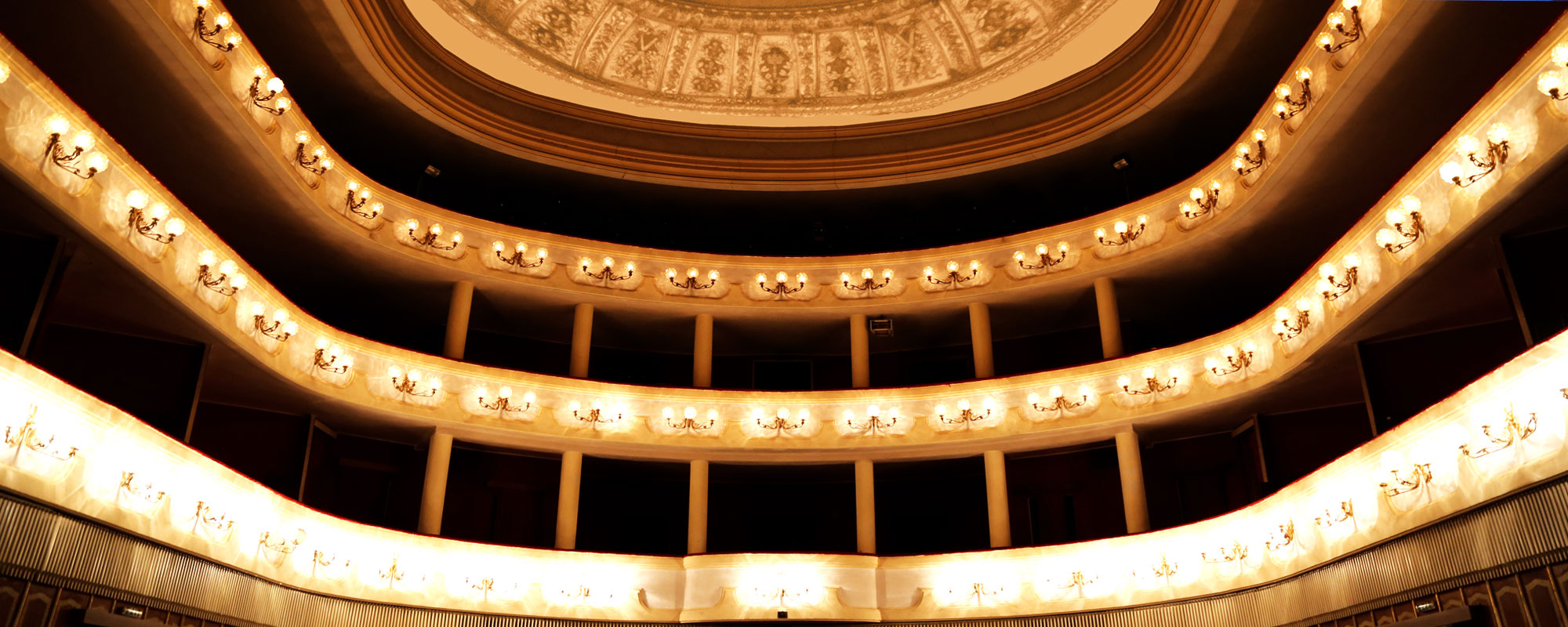Madama Butterfly
Giacomo Puccini

- World premiere
- Teatro alla Scala din Milano, 17 februarie 1904
- Romanian Opera Craiova Premiere
- 30 martie 2024
- Time Length
- aprox. 3h – două pauze
- Extra info
- Spectacol în limba italiană cu supratitrare în limba română
Opera in three acts composed by Giacomo Puccini.
Libretto by Luigi Illica and Giuseppe Giacosa, based on a story by John Luther Long and a play by David Belasco.
DESCHIDEREA STAGIUNII 2024-2025
Eveniment în cadrul Centenarului Puccini
5 octombrie 2024, ora 19.00
Spectacol al Operei Române Craiova pe scena Cercului Militar
https://iticket.ro/event/madama-butterfly
Regie artistică: Chris Catena (Italia)
Asistent regie artistică: Arabela Tănase
Scenografie: Răsvan Drăgănescu
Conducerea muzicală: Francesco di Mauro (Italia)
Distribuția:
Cio-Cio-San – Lisa Houben (Olanda - S.U.A.)
Suzuki – Licia Toscano (Italia)
Kate Pinkerton – Rodica Dinișoară
B.F. Pinkerton – David Baños (Spania)
Sharpless – Ioan Cherata
Goro – Francesco Cipri (Italia)
Prințul Yamadori – Cristian Fofucă
Bonzo – Ioan Toma
Comisarul imperial – Say Ufuk Gengis
Copilul – Andrei Leonte
Orchestra, Corul și Baletul Operei Române Craiova
Biletele sunt disponibile online:
https://iticket.ro/event/madama-butterfly
și la agenția Operei Române Craiova de la Sala Polivalentă, Bulevardul Ilie Balaci nr. 6, 0351.442.471, agentiadebilete@operacraiova.ro
The action takes place at the beginning of the 20th century in Japan, next to the Nagasaki Harbour.
ACT I
Naval officer Benjamin Franklin Pinkerton of the United States rents a house and marries a wife on Nagasaki, though he does not seriously intend to stay in Japan. Mr Sharpless, the American consul, comes to the wedding. Pinkerton talks to the consul in a frivolous manner, he thinks this marriage is a temporary arrangement, just like the rental of the house. He is saying: “And so I’m marrying in Japanese fashion, / Tied for nine hundred / And ninety-nine years, / Free, though, to annul the marriage monthly”. They speak of the bride, the beautiful and young Cho-Cho-San, whose name means “butterfly”. The consul warns the officer that the girl is serious about the marriage. However, Pinkerton says: “No harm I reckon these wings to raise, / And guide them to the tender flights of love!”. The two men toast glasses of wine. The consul: “Here’s to your friends at relations at home.”. Pinkerton: “And to the day on which I’ll wed /In real marriage a real American wife”. The bride climbs up a hill together with her family and friends. They are singing: “What lovely flow’rs! What lovely sky, and lovely sea!”. The bride is singing: “Across the earth and o’er the ocean / Balmy breeze and scent of Spring are blowing / I am the happiest maiden, / The happiest in Japan / In all the world / Friends, I have obeyed / The summons of love, / Upon the threshold standing, / Where all the glory awaits me, / That life or death can offer”. The wedding ceremony takes place. Then, the wedding party is interrupted by the bride’s uncle, a Japanese priest. He has found out that Cho-Cho-San has visited the Christian Mission, as she wishes to become Christian. The uncle curses her: “Cho-Cho-San! Cho-Cho-San! What were you doing at the Mission? / She’s renounced, let me tell you, her true religion! Kami Sarundasiko! / In everlasting torment / May your wicked soul perish! / You have renounced us all and we – all – renounce you!”. The guests are scared and run away. The party is over. The bride and groom are alone. They sing a love duet: “Every star that shines afar / Is gazing on us, lighting our future for us / Ah! Lovely night! Thy perfect calm / Is breathing love near and far!”.
ACT II
Three years later, in the same place. Cho-Cho-San (i.e. “Madame Cho-Cho-San”, “Madame Butterfly”) is home with her maid Suzuki. The latter prays to the gods so that Cho-Cho-San would cry less, since they have not heard from Pinkerton in three years. Suzuki also is worried because they have very little money left. But Cho-Cho-San says: “Lazy and idle / Are the Gods of Japan. / The God my husband prays to / Will give an answer far more quickly / To those who bow before Him. / But I’m afraid He knows not / That here we are dwelling.” Cho-Cho-San is confident that her husband will be back. Prince Yamadori, who knows that Cho-Cho-San has been abandoned by her wife, comes and asks to marry her. Cho-Cho-San rejects him, saying that her country is the United States of America and, according to its laws, she is still married. Mr Sharpless, the American consul, comes to read her a letter he has received from Pinkerton. He is so impressed by the young woman’s emotion that he cannot read the letter to the end. He cannot tell her that Pinkerton has left her, but, instead, encourages her to accept Prince Yamadori’s marriage offer. Cho-Cho-San is appalled by such a suggestion; she brings her young son into the room. Cho-Cho-San says her child’s name is Trouble, but when his father is back his name will be Joy. Mr Sharpless promises to tell Pinkerton that he is the father of a child. After the consul leaves, the harbour cannon is heard, and Cho-Cho-San looks through the telescope and sees Pinkerton’s ship, the American “Abraham Lincoln”. She is overwhelmed with joy. Cho-Cho-San and the maid Suzuki decorate rooms with flowers and wait for Pinkerton. As the night comes, Suzuki and the child fall asleep, but Cho-Cho-San still lies in waiting.
ACT III
An orchestral interlude marks the entrance of “Abraham Lincoln” into Nagasaki harbour, as the sun rises. Suzuki wakes up and convinces Cho-Cho-San that she should rest. Cho-Cho-San and the child go to sleep in another room. Pinkerton and the consul arrive and talk to Suzuki. Pinkerton is accompanied by his wife, Kate. She speaks to Suzuki, telling her that she will take care of the child as if he were her own, but Suzuki is very sad that Cho-Cho-San has to leave the child. Pinkerton is so remorseful and ashamed that he runs off and leaves the women clear things out in his absence. Cho-Cho-San comes in and finds the truth. She agrees to give the child away, but asks for Pinkerton to come and take him in half an hour. As she is alone in her room, Cho-Cho-San grabs her father’s dagger and reads the inscription: “To die with honour when one can no longer live with honour”. Those words had been the Mikado’s message to Cho-Cho-San’s father, many years before. Cho-Cho-San’s father had taken his own life with that dagger. Now, Cho-Cho-San, bids farewell to her son: “O my son, sent to me from Heaven, / Straight from the throne of glory! / Take one last careful look / At your poor mother’s face! / That its memory may linger, / Even though it may be dim and faint. / Let not my beaut’s ling’ring bloom / Be faded quite! / Farewell, beloved!” She then tells the child to go play and kill herself with her father’s dagger. Pinkerton comes back, calling her: “Butterfly! Butterfly!...”
*Grigore Constantinescu & Daniela Caraman-Fotea, Ghid de operă, Bucharest, 1971
**Ana Buga & Cristina Maria Sârbu, 4 secole de teatru muzical, Bucharest, 1999
***Ioana Ștefănescu, O istorie a muzicii universale, Vol. IV, Bucharest, 2002


